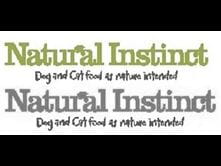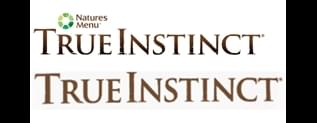 |
 |
| Earlier Mark |
Contested Signs |
The Claimant, Natural Instinct Limited (NI), manufactures and retails raw pet food. The Defendant, Natures Menu Limited (NM), is also a pet food manufacturer and retailer, with a range of products sold under its house brand, NATURES MENU.
In September 2017, NM launched its TRUE INSTINCT brand of pet food. The packaging initially used the sign TRUE INSTINCT with the house brand NATURES MENU and a roundel device. It then dropped the house brand and used TRUE INSTINCT on its own.
Evidence of enhanced distinctiveness, reputation and goodwill
The Claimant brought an action in the UK in the IPEC. It filed ample evidence to show its enhanced distinctiveness and reputation in the UK, including independent third-party reports from IPSOS, Dog's Monthly and Crufts. The Defendant admitted, during the course of proceedings, that NATURAL INSTINCT is "one of the strongest raw food brands". This evidence, coupled with NI's revenue figures and website analytics, served to prove that the Earlier Mark (above left) had been extensively used, had acquired a high level of distinctiveness and had a reputation at the relevant date.
This same evidence also proved to Mr David Stone, sitting as Enterprise Judge, that the Claimant had goodwill in the words NATURAL INSTINCT and in the Earlier Mark. The Defendant also admitted this in the course of proceedings.
Infringement under s10(2) UK Trade Marks Act 1994
The Defendant admitted that its Contested Signs (above right) were similar to the Earlier Mark, but only to a low degree.
The Court was not persuaded by its arguments and found that the signs were:
- Visually similar to a low degree – given that the Contested Signs did not include the words "Dog and cat food as nature intended" and instead included the word TRUE at the beginning of the Contested Signs.
- Aurally similar to a medium degree – given the replication of the word INSTINCT in the dominant and distinctive elements of both marks.
- Conceptually similar to a high degree – given that both marks essentially meant "real instinct" and so shared the same semantic content.
Overall, the judge considered the Contested Signs to be similar to a medium degree to the Earlier Mark.
Given the similarity of the marks, the identity of the goods (pet foods), the enhanced distinctiveness of the Earlier Mark and the average degree of attention of the average consumer, the judge had no problem in finding that there was a likelihood of confusion, and consequently found infringement of the Earlier Mark for the purposes of s10(2).
Infringement under s10(3) UK Trade Marks Act 1994
For a finding of infringement under s10(3), the following elements are required:
- Reputation of the Earlier Mark – this had already been proven and, in any case, the Defendant admitted that the Claimant had a reputation in the Earlier Mark in the UK at the relevant date.
- Use of a sign in the course of trade without the Claimant's consent – the Defendant conceded that its use of the Contested Signs was in the course of trade and without consent.
- Similarity of the signs – this had already been established as part of the test for infringement under s10(2).
- In relation to goods – the Defendant conceded that its use was in relation to goods.<
- A link made between the marks – the Defendant denied that a link would be made between the marks, given what it perceived to be a low level of similarity between the marks. Mr Stone found that the marks were similar to a medium degree and so held that the average consumer would made a link between them, particularly as both marks are used in relation to pet food.
- Detriment to distinctive character or repute, or unfair advantage – Mr Stone found that there would be detriment to the distinctive character of the Earlier Mark due to the logical deduction that a change in the economic behaviour of the relevant public would result from instances of consumer confusion. He also held that there would be detriment to the Earlier Mark's repute, particularly because pet owners care a great deal about their pets and put a great deal of trust in their pet food providers. Finally, Mr Stone held that the Defendant is likely to receive a "leg up" as a result of the mental link formed in consumers' minds, which constitutes an unfair advantage gained from the Earlier Mark.
- Due cause – the Defendant did not prove that its otherwise infringing activity was with due cause.
All elements of the test were met and NM did not prove that its use of the Contested Signs was with due cause, so the judge held that there was infringement under s10(3).
Passing off
The Claimant's passing off claim action also succeeded. As discussed above, the judge held that the evidence overwhelmingly proved that NI had goodwill in NATURAL INSTINCT and in the Earlier Mark.
He used the findings of a likelihood of confusion to hold that there would be a misrepresentation to consumers and damage flowing from this misrepresentation.
Witness evidence and disclosure issues
Much of the judgement is occupied by concerns surrounding evidence and disclosure.
The evidence of one of the Defendant's witnesses was not accepted by the Court due to its many inconsistencies. Furthermore, the Defendant was held not to have adequately fulfilled its duty to disclose known adverse documents as part of disclosure.
Actual evidence of confusion
NI collated and submitted 35 documents purporting to be evidence of actual consumer confusion between the Earlier Mark and the Contested Signs. NM alleged that 35 pieces of evidence was not enough to find a "likelihood" of confusion and that the evidence was not from first-hand sources.
Mr Stone stated decisively that "it is clear … that there is ample evidence of actual consumer confusion by relevant consumers … there is a likelihood of confusion in this case". Importantly, he also noted that the submission of 35 pieces of second-hand evidence was proportionate and entirely consistent with IPEC litigation requirements.
Key takeaways
- A finding of trade mark infringement is made more likely where the mark has been used extensively and has an enhanced level of distinctiveness in the UK.
- Evidence of actual confusion can support and augment the court's assessment of the likelihood of confusion. This need not be first-hand evidence or submitted in high quantities for it to be valuable.
Case reference: Natural Instinct Limited v Natures Menu Limited [2020] EWHC 617 (IPEC)





